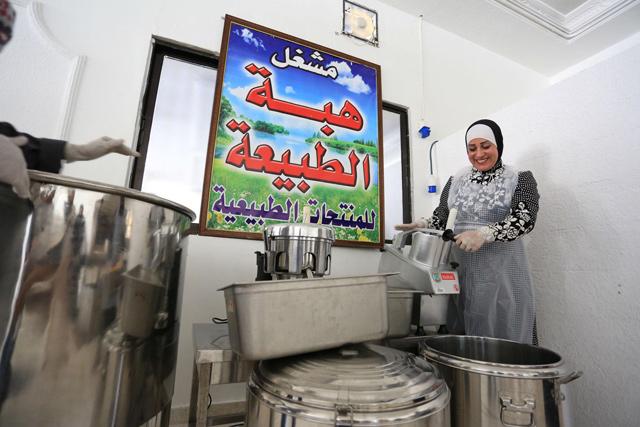You are here
‘Being able to license my home-based business changed my life’
By Camille Dupire - Jul 03,2018 - Last updated at Jul 03,2018

Hiba Qandeel was the first woman in Zarqa Governorate to obtain a work permit for her home-based business (Photo courtesy of USAID LENS)
AMMAN — Almost a year ago, the Ministry of Municipal Affairs opened the door for home-based entrepreneurs to legally run their businesses within the boundaries of municipalities, in a move aimed at boosting home-based businesses' (HBB) contribution to the local economy.
For Hiba Qandeel, owner of “Hibat Al Tabee’a” (in Arabic, “Gift of Nature”), a natural herb and food products company, this new law of registration and licensing of home projects represented the perfect opportunity to formally establish and expand her business, which now employs over 20 individuals.
Qandeel became the first woman to obtain a work permit for her HBB in the Greater Zarqa Municipality, where she paved the way for over 30 female entrepreneurs to develop and license their HBB projects.
"Before 2017, licensing a home-based business was not accessible in Zarqa Governorate. Since the regulations passed, Hiba has helped us license our businesses and she was a great inspiration for us to think about various ways to develop our projects,” local entrepreneur Maha Amara, who runs a business for sweets and dates, said.
In September 2017, the Ministry of Municipal Affairs approved the regulations concerning the licensing of HBB, which stipulated that businesses “should not involve machinery, manufacturing processes or services that would produce noise, smoke, dust, or smell… should not use or produce hazardous materials that would jeopardise the public health and should not exceed 15 per cent of the home’s area”, the Jordan News Agency, Petra, reported.
Qandeel was supported in her endeavours by the USAID Jordan Local Enterprise Support (LENS) project, which provided her with financial support in 2015 to expand her business which at the time employed five women on a full-time basis and up to 15 women during high season.
Since then, she has strived to encourage her female peers to develop and register their home based projects, in cooperation with the Directorate of the Commercial Registry in Zarqa, which provided women with all facilities and continuous assistance.
"It took me only two days and it was easy and trouble-free," said Nima Rifai, who owns a home-made pickles business, adding "I used to think that the registration process was too complicated and that the entrepreneur had to pay large amounts of taxes but I realised that I could do it very easily with the legal assistance provided by USAID LENS”.
USAID LENS also organised training courses on communication and marketing skills, project and time management, budgeting and file keeping to help the women develop the skills needed to run their businesses efficiently.
"Although it has not been long since I obtained my licence [in February of this year], it really boosted my confidence in my business; I have received so much praise and I can now confidently distribute samples of my products to companies and institutions," Amara told The Jordan Times.
"This is only the first step towards systematically involving more women to work legally," Rifai said. In addition to the licensing, she called for offering training courses to empower local women to design “clear gradual plans of action and business expansion".
As of July 1, the ministries of municipal affairs and industry and trade and the Greater Amman Municipality launched a joint campaign to increase awareness about the new HBB regulations, aiming to encourage people operating their business informally from home to register legally as a formal home-based enterprise.
"The issuance of the licensing regulations was an important step for us," recounted Qandeel, who expanded her business and was able to export her products to Kuwait and Saudi Arabia.
She said that these instructions helped HBB access new markets that they could not enter as long as their projects were unlicensed, and thus illegal. "Because we pay taxes for our businesses, we can now sell our products to supermarkets, festivals and various exhibitions, rather than just a specific category of customers due to the previously illegal nature of our work."
"We, women, need to know that we can't just sit at home waiting for a miracle to happen and change our lives. I believe we are all capable of achieving remarkable things, we just need to work hard," Qandeel told The Jordan Times.
The instructions also enabled entrepreneurs to submit their products for food quality testing to the Royal Scientific Society, which "greatly enhanced their credibility to the public", Qandeel, Amara and Rifai said, noting that, with their products being subject to Food and Drug Administration checks, customers now feel "much more comfortable in buying them".
A typical informal, unlicensed Jordanian HBB earns JD100 to JD300 per month, almost all of which is spent for the family’s livelihood needs, according to a USAID LENS study, which stated that HBBs, if formaised, could collectively contribute more than JD ten million directly to the national economy and JD 40 million indirectly.
Although women-owned businesses constitute only 10 per cent of all businesses in Jordan, they employ up to 55 per cent of all women in the workforce, according to the research.
For Qandeel, being able to officially license her projects was a "real boost" that she hopes will “help motivate other young women in the community to finish their studies instead of dropping out to find jobs”.
More information on the HBB regulations campaign can be found at www.hbbjordan.com.
Related Articles
AMMAN — The “My work is from My Home” exhibition and bazaar, which was the “first of its kind” and aimed to promote registered and licensed
AMMAN — With the growing interest in home-based businesses, there still remains hesitation when it comes to obtaining work permits, accordin
AMMAN — The 10th Mediterranean Women Entrepreneurs Forum, “Women in Tech: the way ahead”, recommended the review and development of Jordania















